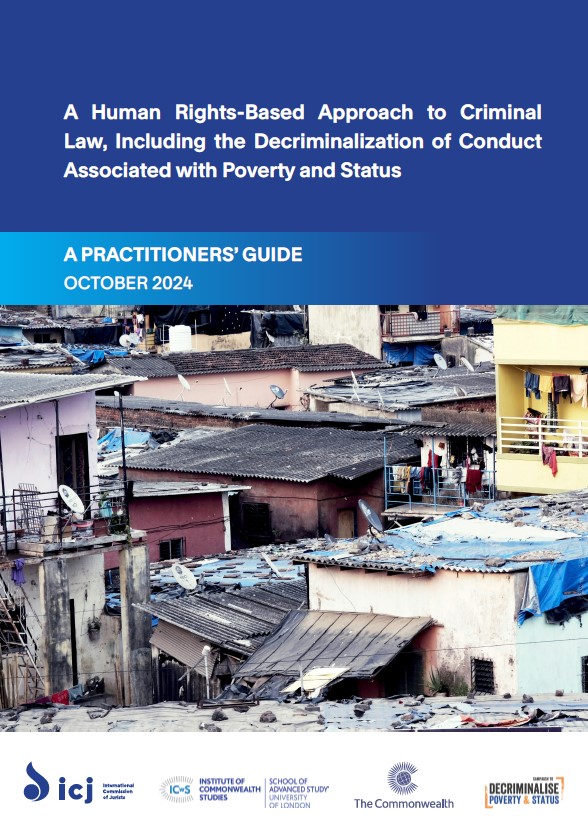The International Commission of Jurists (ICJ) – together with the Institute of Commonwealth Studies (ICwS) and the Commonwealth Secretariat (ComSec) – has launched a new Practitioners’ Guide on “A Human Rights-Based Approach to Criminal Law, Including the Decriminalization of Conduct Associated with Poverty and Status”, as part of the Global Campaign to Decriminalise Poverty and Status.
“In criminal justice systems around the world, marginalized individuals and groups are disproportionately represented among ‘criminal suspects’ and ‘offenders’. People experiencing poverty and homelessness are criminalized through ‘petty’, ‘minor’ offences, such as loitering, begging, informal trading, sleeping rough, vagrancy, littering and inability to pay civil debts. At the heart of their plight is the unjustified criminalization of individuals and sometimes entire communities, through laws that wrongfully treat poverty, homelessness and status as crimes,” said Livio Zilli, ICJ Deputy Program Director, Legal and Policy Office.
This Practitioners’ Guide addresses the global, growing trend towards the wrongful criminalization of conduct associated with poverty, homelessness and status by presenting a human rights-based approach to criminal law, based on general principles of criminal law and international human rights law and standards. This approach can be used to address the detrimental impact of the criminalization of this conduct on health, equality and other human rights and to further its decriminalization.
The Guide, the first of its kind, aims to serve as a practical tool and comparative law casebook to justice sector actors and others – such as legislatures, government officials, policy-makers, national human rights institutions, oversight bodies, victims’ groups, human rights advocates, civil society organizations and academics – offering a clear, accessible and operational legal framework and practical legal guidance on a human rights-based approach to criminal law. It aims to assist justice sector actors and others in pursuing legal advocacy and reform efforts for the review and repeal of discriminatory laws that are antithetical to human rights and the rule of law.
Drawn extensively from international, regional and domestic laws in relation to the criminalization of conduct associated with poverty, homelessness and status, the Guide sets out:
- A human rights-based approach to criminal law, including the general principles of criminal law and international human rights law and standards, outlined in “The 8 March Principles for a Human Rights-Based Approach to Criminal Law Proscribing Conduct Associated with Sex, Reproduction, Drug Use, HIV, Homelessness and Poverty”, published by the ICJ in 2023;
- How to apply a human rights-based approach to criminal law by providing concrete examples to demonstrate how it may be applied in practice to the criminalization of conduct associated with poverty, homelessness and status;
- The criminalization of conduct associated with poverty and status at the domestic level through examples from various jurisdictions to demonstrate the application of a human rights-based approach to criminal law, including by showing how, for example, “vagrancy laws” in specific countries are generally incompatible with a human rights-based approach to criminal law; and
- A compilation of the growing body of domestic legal developments and jurisprudence around the world, as advocates seek to challenge the lawfulness of laws penalizing conduct associated with poverty, homelessness and status.
The Guide assembles concrete suggestions on the pivotal roles that lawyers, judges, prosecutors, law enforcement officials, legislators, policymakers, national human rights institutions and civil society can play in dismantling problematic legal frameworks and practices unjustly criminalizing conduct associated with poverty, homelessness and status.
Background
“The Global Campaign to Decriminalise Poverty and Status” is a coalition of organizations from across the world that advocate for the repeal of laws, reform of policies and change in practices, that target people based on poverty, status or for their activism.
The Guide was launched at a side event at the Commonwealth Heads of Government Meeting (CHOGM) in Samoa. Speakers at the side event included:
- Justice Aruna Devi Narain, Supreme Court Justice of Mauritius and ICJ Commissioner
- Daron Tan, ICJ Legal Adviser and lead drafter of the Guide
- Professor Kingsley Abbott, Director of the ICwS
- Dr Elizabeth Macharia, Head of the Rule of Law Section at the ComSec
- Dr Cherisse Francis, Senior Law Lecturer at the St Mary’s University, London, UK
- Jeshua Bardoo, Director of the East Caribbean Alliance for Diversity and Equality (ECADE)
The Guide was produced following consultations with civil society and justice sectors across Asia, the Caribbean and Africa, following a presentation in March 2024 at the Commonwealth Law Ministers Meeting in Zanzibar on the need to decriminalize conduct associated with poverty, homelessness and status.
Download
The Practitioners’ Guide can be downloaded here (PDF).




